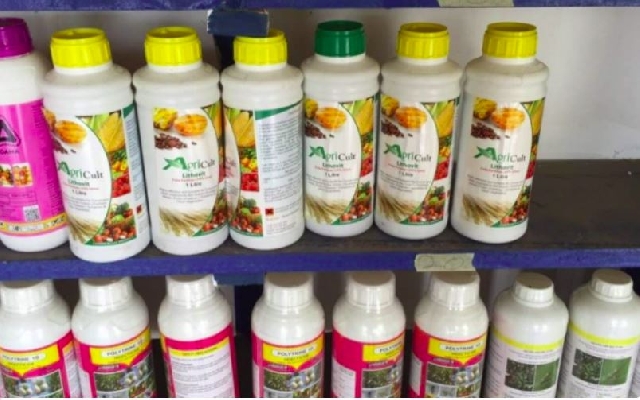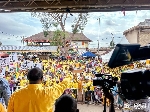EOCO investigator in COCOBOD case drops bombshell
 Lithovit
Lithovit
In a surprising turn of events, it has been revealed at the trial of Dr Stephen Opuni and Seidu Agongon that, the prosecution failed to disclose a pivotal test result conducted on lithovit foliar fertiliser by the Ghana Standards Authority in 2017.
The concealed evidence, which showed a positive result confirming the product as a fertilizer, raises concerns about the transparency of the legal proceedings.
During the court proceedings, Senior Investigator Paul Agyei Gyang from the Economic and Organised Crime Office (EOCO) disclosed that, while the initial sample of the Lithovit Fertilizer, obtained from the Ghana Cocoa Board (COCOBOD) and submitted to the Food and Drugs Authority (FDA), yielded a negative result, indicating it was not a fertilizer, a second sample, agreed upon by both COCOBOD and Agricult management, was sent to the Ghana Standards Authority for a second test on June 30, 2017. The outcome of this test unequivocally identified the substance as a fertilizer.
EOCO, received the second test result on July 2, 2017, addressed to the executive director. However, the prosecution failed to present this crucial evidence in court, leading to questions about the transparency and fairness of the trial.
Under cross-examination by Seidu Agongo’s counsel, Benson Nutsukpui, Agyei Gyan, confirmed that the second test report from the Ghana Standards Authority, explicitly stated that the substance was a fertilizer. Despite the prosecution’s claim of possessing a copy of the second test result, it was conspicuously absent from the evidence presented in court.
Further complicating matters, it was revealed in court that the first test result, which initially returned a negative outcome for lithovit, was conducted at the Drugs Forensic Cosmetic Department for analysis.
EOCO’s investigation found that this department was ill-equipped to analyze fertilizers, casting doubt on the reliability of the initial test results.
The revelation of withheld evidence, has raised serious questions about the integrity of the prosecution’s case and has become a focal point in the ongoing trial of Dr. Opuni and Mr. Agogon.
He said it was around January 17, 2017, that an investigation was referred to the Unit through the Deputy Executive Director of Operations from the Executive Director of EOCO.
He said Dr Adu Amponsah, the Deputy Chief Executive in charge of Agronomy and Quality Control at COCOBOD, brought in samples of Lithovit to have it tested.
“I was called into the Executive Director’s Office and given the bottles of the product together with covering letter from COCOBOD, which had details of the product,” he added.
Benson Nutsukpui, asked the witness, “What is your recollection of the second test from the Ghana Standards Authority.”
“From the face of it, the report said it was fertiliser,” Mr Agyei Gyan confirmed who is the subpoena witness for Mr Agongo, the accused person.
“You mean the second report from Standards Authority, which was picked by all parties, says it was a fertiliser,” counsel further asked, to which the witness answered, “Yes, my Lord”.
“Even with the seal broken, the content was fertiliser,” Mr Nutsukpui wondered, and Mr. Agyei Gyang reiterated, “Yes, my Lord, according to the report”.
Paul Agyei Gyang, made the revelation at the High Court on Monday, February 19, 2024, detailing how a previous report by the Authority, conducted by the wrong department on the same product, and tendered in evidence by the prosecution, had a different result.
Mr Agyei Gyan, who was the Head of the Organised Crime Unit of the Economic and Organised Crime Office (EOCO), when the anti-graft agency investigated COCOBOD’s procurement of lithovit foliar fertiliser between 2014 and 2016, was giving his evidence in chief as a subpoenaed witness in the ongoing trial of former COCOBOD Chief Executive, Dr Stephen Opuni, and businessman Seidu Agongo.
He recalled that in 2017, the then Deputy Chief Executive of COCOBOD, Dr. Yaw Adu-Ampomah, who is the third prosecution witness, brought samples of lithovit to EOCO for testing.
EOCO, he said, sent a sample to the Chemistry Department of the University of Ghana and another to the Ghana Standards Authority for testing.
“My Lord, the purpose was to establish through the experts whether or not the chemical lithovit was fertiliser,” and “allegedly reported to have been fraudulently sold to COCOBOD,” the lead investigator, who is now at the Operations Directorate of EOCO as a senior staff member, told the court presided over by Justice Aboagye Tandoh.
In May 2017, EOCO received the first report from the Ghana Standard Authority; he noted, “On the surface of the report, without making reference to the chemical compositions that were on it, to the ordinary eye, what we saw was that the chemical which was submitted to the Ghana Standard Authority lacked the ingredients to make it qualify as fertiliser.”
According to Mr Agyei Gyan, when the Executive Director of EOCO had gone through the report, “he directed that the accused, Seidu Agongo, by then he was a suspect, be charged with the appropriate offence immediately.”
The witness recalled that Mr Agongo was invited by EOCO and in the company of his lawyer, where he objected to the test result shown to him in the presence of the Executive Director, noting that Mr Agongo was not given prior notice about the whole process.
“He objected that the chemical we tested probably might not be part of the product he supplied to COCOBOD,” he said.
He was, therefore, asked to come back later to enable EOCO to further “deliberation about the test result” with Dr Adu-Ampomah, Mr Agyei Gyang said.
Mr. Agongo’s protest paid off as EOCO directed that a second test be conducted on lithovit foliar fertiliser at the Ghana Standards Authority. This time, all parties, including Seidu Agongo and COCOBOD, were involved in the selection of the sample and testing.
The then Head of Organised Crime Unit at EOCO, told the court that as the parties agreed, they met at one of the warehouses of COCOBOD at Spintex, where two security men from COCOBOD, had been given instructions to provide the team with a sample of lithovit.
“My Lord, the security officers on behalf of COCOBOD gave samples whose seal had been broken to the investigator,” the witness said.
Asked if Mr Agongo reacted, he replied, “Yes, my Lord, according to the investigator, the second accused initially objected to the bottle because the seal had been broken, but seeing his label on it, he said the label was his, but cannot guarantee what was inside.”
When the witness was, asked if he had ever heard of the name Material Science Department of the Ghana Standards Authority, he responded in the affirmative.
“Yes, my Lord, if I may throw some light on the results of the three tests. My Lord, after receiving the test results from Ghana Standards Authority, the team met with the executive director and his deputy and having seen the changes in the results, my Lord, we invited the two scientists who worked on the substance.
“The first substance, the one that went first, which was addressed to the chief executive of Ghana Standards Authority, was referred to the Drugs Forensic Cosmetic Department for analysis. And then the second one which was also addressed to the chief executive, was referred to the Material Science Department for analysis.
“EOCO addressed the two letters to the chief executive of Ghana Standards Authority, but one ended at the Material Science Department and the other Drugs Forensic Cosmetic Department for analysis. So we invited the heads of the two departments together with the analysts who did the analyses, and my Lord, from their analyses, both departments were looking for different chemical components.”
The witness was therefore asked if the investigative team found out which of the two departments was equipped to analyse fertiliser: the Material Science Department on the one hand and the Drugs Forensic Cosmetic Department on the other hand.
“My Lord, from the analysis from the Material Science Department, they were equipped to analyse the substance,” Mr. Paul Agyei Gyang, who was in charge of the Organised Crime Unit of EOCO, told the court.
Meanwhile, the court has directed the witness to produce a copy of the second test result from the Ghana Standards Authority, which said lithovit is fertiliser.
The witness also contested a copy of the test result from the Chemistry Department of the University of Ghana, which was tendered in evidence by the prosecution and purported to be what was sent to EOCO. He was, therefore, asked to produce EOCO’s copy of the test result, which he said was addressed to the executive director.
He further revealed that EOCO never completed investigations into the alleged fraudulent importation of agrochemicals sold to COCOBOD.
Mr Gyang told the Accra High Court, that during the investigations, the Organised Crime Unit, which he used to head, was asked to hand over the docket to the Police for further investigation.
Dr Opuni, Seidu Agongo and Agricult Ghana Ltd, are currently facing a combined 24 charges: Abetment of crime, defrauding by false pretence, contravention of the Public Procurement Act, willfully causing financial loss to the state, manufacturing fertiliser without registration, selling misbranded fertiliser and selling adulterated fertiliser, Corruption by a public officer.
Seidu Agongo and Agricult Ghana Ltd were, however, acquitted on three counts of money laundering they were charged with when the case began. The three have pleaded not guilty to the charges and are on a GH¢300,000.00 self-recognisance bail each.
Source: Herald
Trending News

I was surprised over exclusion from ministerial position in Akufo-Addo's second term-Atta Kyea
12:21
NDC annuls Amenfi Central Parliamentary primary
17:55
NDC's ORAL Brigade clashes with security at Finance Ministry
15:40
Walewale NPP parliamentary primary re-run to take place Sept. 8
14:56
Alan Kyerematen wins Zongos with Zumunta launch
08:36
Settle Ghana slams Atta Kyea for defending President Akufo -Addo on failed galamsey fight
14:09
O'Reilly SHS student murder: Suspect remanded for two weeks
16:23
NE/R: NPP suspends two executives in Walewale over allegations of gross misconduct
15:01
AG calls for global unity in tackling cross-border financial crimes
12:36
FDA warns public against palm oil laced with ‘Sudan IV’
14:47




